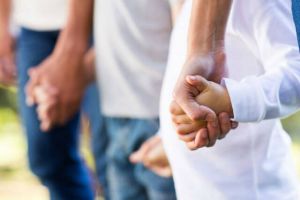
Every one of us craves the human connection. It is as essential to our existence as breathing. From the time of our conception, we learn what it means to be bonded to another human being by the sound of our mother’s heartbeat. That need for connection stays with us until our dying breath.
So, what happens when we have lost it? When something so vital to our existence is gone, what do we do?
Filling the void
For most of us, we try to fill that void. It’s how we choose to fill it, and what we fill it with, that can determine the course of our lives. Some people find positive and inspiring ways to reach out to others and establish friendships. Others turn to temporary fixes that end up feeling empty in the end, like sex, gambling, and drugs.
Addiction is a powerful force. The American Society of Addiction Medicine defines addiction as “a primary, chronic disease of brain reward, motivation, memory and related circuitry. Dysfunction in these circuits leads to characteristic biological, psychological, social and spiritual manifestations. This is reflected in an individual pathologically pursuing reward and/or relief by substance use and other behaviors.”
Factors of addiction
There has never been a conclusive one-size-fits-all explanation for addiction. We know that many factors can contribute to the development of addiction. Factors like environment and genetic disposition all come into play.
In an effort to understand more about addiction, Bruce Alexander, a professor of psychology in Vancouver, held an experiment in the 1970s with rats and morphine. He took into account that rats who are isolated in a cage with only a supply of either plain water or morphine-laced water will continue drinking the drugged water until they die.
With this in mind, Alexander built a structure he called “Rat Park,” which had tunnels, colored balls, and multiple rats to interact with. When he provided these rats with plain and drugged water sources, they mostly stayed away from the drugged water. None of them died.
He then took the experiment a step further. He took rats that had been isolated and living on drugged water for 57 days, and introduced them into Rat Park. The rats did display some initial signs of withdrawal, but they soon stopped using the drugged water and returned to normal activities.
Real world rats in a cage
Is it possible that putting rats in a happy, stimulating environment encouraged them to live actively together and stopped their addiction? Let’s consider the real world implications on a grander scale.
We live in an age where we have access to an overload of information, entertainment, and distractions. We have become so attached to our video games, tablets, and smartphones that it is not surprising to see a group of teenagers around a table where no one is talking or even looking at each other. Instead, they are locked onto the screen they hold in their hands.
This deep dependence on technology could be constituted as an addiction. We believe it makes us feel connected to the world, but maybe we are losing our connection with each other.
Reclaiming our lives
 Fifteen years ago, Portugal had a terrible drug problem in their country and decided to fight it in a new way. Drugs were decriminalized and the money was used to reconnect with drug addicts and teach them how to get back into society. They were given secure housing, jobs to provide them with purpose, and compassionate counseling to deal with their emotional traumas.
Fifteen years ago, Portugal had a terrible drug problem in their country and decided to fight it in a new way. Drugs were decriminalized and the money was used to reconnect with drug addicts and teach them how to get back into society. They were given secure housing, jobs to provide them with purpose, and compassionate counseling to deal with their emotional traumas.
According to a study published in the British Journal of Criminology, this decriminalization led to a 50 percent decrease of injected drug use.
Reconnecting with each other as human beings may not be a complete solution, but it is definitely a solid step in the right direction.
-The Alternative Daily
Sources:
http://www.huffingtonpost.com/johann-hari/the-real-cause-of-addicti_b_6506936.html
http://waiorahealingwaters.com/2012/12/07/human-connection
http://nourishmedicine.com/the-healing-power-of-human-connection

